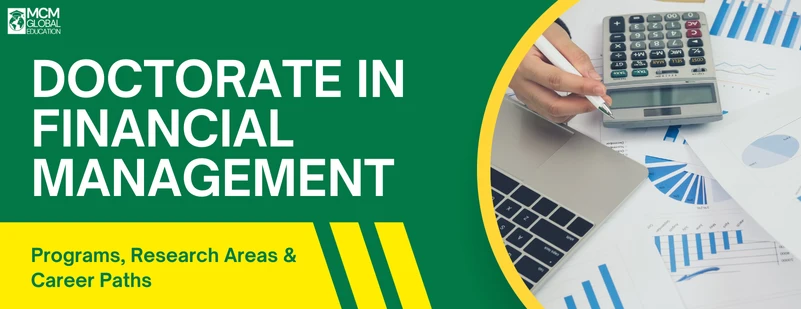In today’s complex global economy, organizations face challenges that go beyond traditional financial practices. From managing risk in volatile markets to integrating sustainability into corporate strategy, the demand for advanced financial expertise is growing rapidly. A Doctorate in Financial Management is the highest academic qualification in this field, designed for those who aspire to lead research, influence corporate policy, and contribute to financial innovation.
This guide explores everything you need to know about pursuing a doctorate in financial management—from its academic foundations to career outcomes.
Table of Contents
What is a Doctorate in Financial Management?
A Doctorate in Financial Management (PhD or DBA) is a research-focused degree that equips candidates with deep theoretical and practical knowledge of finance, economics, and organizational strategy. Unlike a master’s degree that focuses on applied skills, a doctorate emphasizes:
- Original research in finance
- Development of new models and theories
- Advanced empirical and quantitative analysis
- Contributions to both academia and industry
Graduates of this program often take leadership roles in universities, corporations, government agencies, and international organizations.
Core Disciplines of Financial Management
Doctoral candidates master a wide spectrum of financial concepts, blending corporate, managerial, and behavioral finance with advanced econometrics.
| Core Discipline | Focus Area |
|---|---|
| Corporate Finance | Capital structure, mergers & acquisitions, working capital management |
| Managerial Finance | Planning, directing, and controlling organizational financial activities |
| Financial Econometrics | Time-series analysis, asset pricing models, volatility forecasting |
| Behavioral & Experimental Finance | Investor psychology, biases, experimental market analysis |
| Strategic Financial Management | Long-term financial planning, risk-return trade-offs, value creation strategies |
This multidisciplinary foundation ensures that graduates can address both technical financial problems and strategic organizational challenges.
Contemporary Research Themes in Doctoral Finance
The world of finance is rapidly evolving, influenced by globalization, digitalization, and sustainability concerns. Here are some key research themes explored in a doctorate in financial management:
1. FinTech & Emerging Technologies
- Blockchain and decentralized finance (DeFi)
- Artificial Intelligence (AI) for financial forecasting
- Robo-advisors and algorithmic trading
- Quantum computing in finance
2. Sustainable Finance & ESG
- ESG (Environmental, Social, Governance) integration in corporate strategy
- Green bonds and impact investing
- Climate risk assessment in financial markets
- Ethical investing and corporate responsibility
3. Risk & Investment Management
- Systemic risk and financial crises
- Portfolio optimization and asset allocation
- Credit risk modeling and derivatives pricing
- High-frequency trading and volatility forecasting
4. International Finance & Policy
- Foreign direct investment (FDI) and global capital flows
- Exchange rate volatility and trade finance
- Central bank digital currencies (CBDCs)
- Financial globalization and regulatory frameworks
5. Behavioral Finance
- Overconfidence and investor biases
- Loss aversion and risk perception
- Gender differences in financial decision-making
- Behavioral influences on corporate governance
6. Corporate Finance & Governance
- Dividend policy and firm value
- Corporate restructuring and M&A strategies
- Role of corporate governance in financial performance
- Working capital management during crises
Program Structure & Curriculum
While exact requirements vary across institutions, most doctorate in financial management programs follow a similar structure:
| Stage | Description |
|---|---|
| Coursework (Year 1–2) | Core finance theory, econometrics, corporate strategy, FinTech, ESG finance |
| Comprehensive Exams | Assess knowledge across all major financial management domains |
| Research Proposal | Development of a dissertation topic with original contribution |
| Dissertation Research (Years 2–4) | Data collection, econometric modeling, case studies, simulations |
| Publication & Conferences | Presenting research in peer-reviewed journals and academic conferences |
| Defense (Final Year) | Oral defense before a doctoral committee |
Many programs encourage interdisciplinary study—combining finance with economics, law, data science, or sustainability studies.
Sample Doctoral Research Topics
Choosing a dissertation topic is a crucial step in your doctoral journey. Here are trending areas to consider:
| Research Area | Sample Topic |
|---|---|
| FinTech | Blockchain adoption in multinational treasury operations |
| Sustainable Finance | ESG ratings and their effect on investment performance |
| Risk Management | Big data-driven credit risk models in commercial banking |
| Behavioral Finance | Investor overconfidence during financial crises |
| Corporate Finance | Dividend policies and shareholder value in emerging markets |
| International Finance | Central bank digital currencies and their global financial stability implications |
Career Pathways After a Doctorate in Financial Management
Graduates with a doctorate in this field have career opportunities across academia, industry, and policy-making.
| Career Path | Potential Roles |
|---|---|
| Academia & Research | Professor of Finance, Postdoctoral Fellow, Research Director |
| Corporate Leadership | Chief Financial Officer (CFO), Head of Risk Management, Director of Treasury |
| Consultancy & FinTech | Blockchain Strategist, ESG Investment Consultant, FinTech Analyst |
| Government & Policy | Central Bank Researcher, Regulatory Advisor, Financial Policy Analyst |
| International Organizations | IMF/World Bank Financial Specialist, UN Sustainable Finance Expert |
Why These Careers Matter
- Academic Impact: Teaching and publishing groundbreaking finance research.
- Corporate Impact: Driving financial innovation and sustainability within global firms.
- Policy Impact: Shaping regulatory frameworks and economic policies.
Benefits of Pursuing a Doctorate in Financial Management
- Advanced Expertise – Gain mastery in finance, econometrics, and strategic decision-making.
- Research Contribution – Publish research that influences both academia and practice.
- Career Advancement – Access top-tier positions in academia, corporations, and global institutions.
- Global Relevance – Tackle challenges such as digital disruption, sustainability, and financial crises.
Future Trends in Doctoral Finance Research
The financial industry is undergoing a digital and sustainable transformation. Future doctoral research is likely to focus on:
- AI & Big Data in financial modeling and risk assessment
- Digital Currencies and blockchain-based ecosystems
- Climate Finance and sustainable development goals (SDGs)
- Behavioral Insights in global investment markets
- Quantum Finance for solving complex computational problems
These areas ensure that a doctorate in financial management remains relevant in shaping the future of finance.
Conclusion
A Doctorate in Financial Management is more than just a degree—it’s a gateway to becoming a thought leader in finance. This advanced qualification empowers graduates to push the boundaries of knowledge, shape financial strategies, and influence policy-making at national and international levels.
Whether your research passion lies in FinTech, sustainable finance, behavioral economics, or risk management, pursuing this doctorate ensures that your work makes a lasting global impact.
If you are ready to position yourself as a pioneer in finance, explore doctoral programs, connect with advisors, and begin your journey into one of the most dynamic fields of study today.























